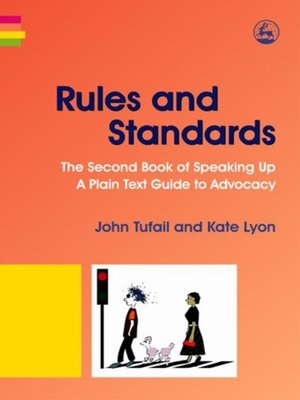Rules and Standards
ebook ∣ The Second Book of Speaking Up: A Plain Text Guide to Advocacy
By Kate Lyon

Sign up to save your library
With an OverDrive account, you can save your favorite libraries for at-a-glance information about availability. Find out more about OverDrive accounts.
Find this title in Libby, the library reading app by OverDrive.



Search for a digital library with this title
Title found at these libraries:
| Loading... |
The Four Books in this series; 'Introducing Advocacy', 'Rules and Standards', 'Listen Up!' and 'Advocacy in Action' are comprehensive, informative and quite simply a very good introduction for someone new to the world of advocacy.'
- Practice Links in Social Work
Advocacy for people with disabilities is widely practised, but what about self-advocacy? How often do parents or carers speak 'for' you and prevent you being heard? Do you know your rights within advocacy law? The four books in the Speaking Up set were conceived and written specifically to promote self-advocacy to disabled individuals who want to learn how to speak up for themselves.
This second book in the series explores the idea of rules and standards for advocacy and looks at the advocacy charter. It covers issues such as whether an advocate should share a confidence if they are worried that their advocacy partner might self-harm.
All four books are illustrated throughout with colour drawings and case studies showing the positive results of self-advocacy on the individuals themselves, as well as on their families and carers.
This empowering training package encourages an equal partnership between the advocate and the user where the shared goal is to develop the life skills of the individual with learning difficulties. It is accessible to people with a wide range of literacy needs, including those with high learning needs and is designed for use in formal and informal learning situations, either unsupported or with a facilitator present.







